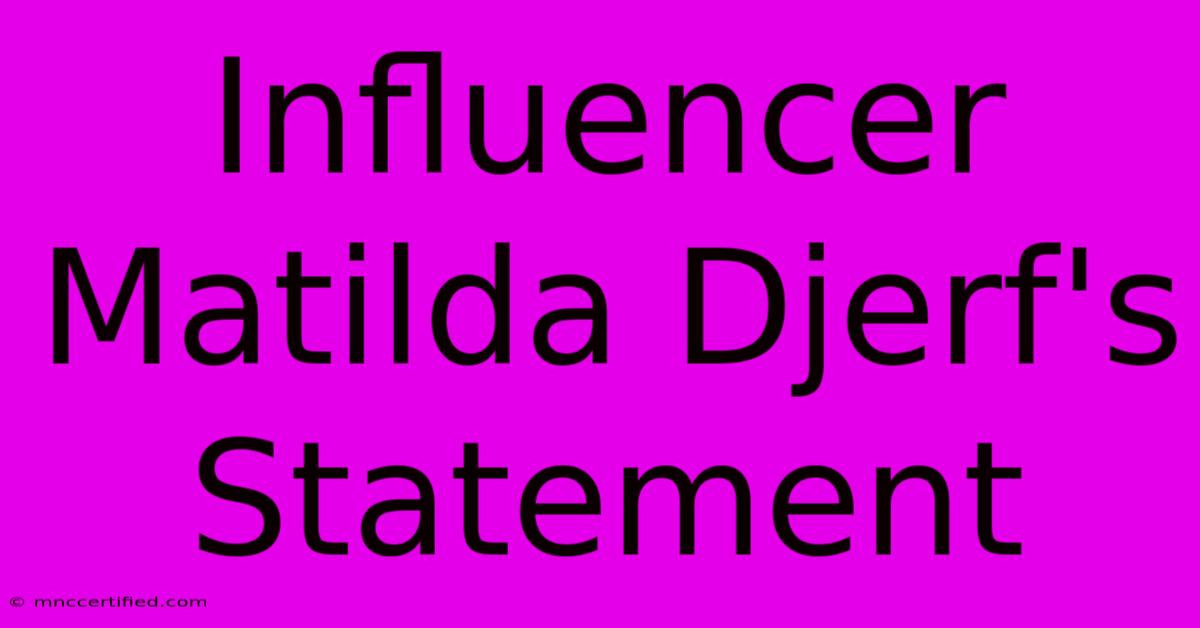Influencer Matilda Djerf's Statement

Table of Contents
Influencer Matilda Djerf's Controversial Statement: A Deep Dive into the Fallout and its Implications
Matilda Djerf, a prominent Swedish influencer with millions of followers across various platforms, recently found herself at the center of a significant controversy. Her statement, which we will analyze in detail below, sparked widespread outrage and ignited a crucial conversation about influencer responsibility, brand authenticity, and the impact of online personas. This article will dissect Djerf's statement, examine the public reaction, and explore the broader implications of the incident for the influencer marketing landscape.
Understanding Matilda Djerf's Controversial Statement
While the exact wording of Djerf's statement may vary depending on the source, the core message revolved around a perceived disconnect between her online persona and her personal life. She essentially acknowledged a curated reality presented on social media, admitting that not everything showcased was an accurate reflection of her everyday experiences. This confession, while seemingly innocuous to some, triggered a powerful backlash from her audience.
Key Points of the Statement & Their Interpretation:
- Acknowledgement of Curated Content: Djerf's statement implicitly acknowledged the artificiality often present in influencer content. This is a significant point, as many influencers maintain a facade of constant perfection and happiness, leading to unrealistic expectations among their followers. Her admission challenged this trend.
- Differentiation Between Online and Offline Life: The statement drew a clear distinction between the meticulously crafted image projected online and the less polished reality of her personal life. This resonates with a growing awareness among consumers about the curated nature of social media.
- Potential Implications for Brand Partnerships: The controversy raises questions about the authenticity of her brand partnerships. If her online persona is significantly different from her real self, how genuine are her endorsements? This fueled skepticism among her followers and potential brand collaborators.
The Public's Reaction: Outrage, Disappointment, and Dialogue
The response to Djerf's statement was multifaceted. While some applauded her honesty and transparency, many expressed feelings of betrayal and disappointment. Accusations of inauthenticity and misleading marketing tactics were prevalent. The controversy quickly escalated, dominating online discussions and becoming a trending topic across several social media platforms.
Analyzing the Negative Feedback:
- Broken Trust: Many followers felt betrayed by the revelation, viewing it as a breach of trust between influencer and audience. This highlights the importance of authenticity and genuine connection in influencer marketing.
- Questioning Brand Partnerships: The controversy intensified scrutiny on Djerf's collaborations with brands. Consumers questioned the legitimacy of endorsements if the influencer's portrayed lifestyle was not genuine.
- Demand for Greater Transparency: The incident underscores a growing demand for more transparency and honesty from influencers. Followers are increasingly seeking genuine connections and realistic portrayals, rather than idealized versions of reality.
Long-Term Implications for the Influencer Marketing Industry
Matilda Djerf's statement serves as a crucial case study in the evolving influencer marketing landscape. It highlights the need for greater transparency, authenticity, and a more nuanced understanding of the relationship between influencers and their audiences.
Key Takeaways for Influencers:
- Prioritize Authenticity: Focus on building genuine connections with your audience based on honesty and relatability.
- Embrace Transparency: Acknowledge the curated nature of social media and avoid presenting a misleading portrayal of your life.
- Ethical Brand Partnerships: Only partner with brands you genuinely believe in and whose values align with your own.
Key Takeaways for Brands:
- Due Diligence: Conduct thorough background checks on influencers to ensure alignment with brand values and authenticity.
- Focus on Value, Not Just Reach: Prioritize influencers who foster genuine connections with their audience, rather than simply focusing on follower count.
- Embrace Transparency in Marketing: Be open and honest about sponsored content and influencer relationships.
Matilda Djerf's statement, despite its controversial nature, sparked a much-needed conversation about the ethics and responsibilities within the influencer marketing industry. The long-term implications will undoubtedly shape how influencers and brands approach content creation and audience engagement moving forward. The incident serves as a potent reminder that authenticity and transparency are no longer optional; they are crucial for long-term success and maintaining trust with consumers.

Thank you for visiting our website wich cover about Influencer Matilda Djerf's Statement. We hope the information provided has been useful to you. Feel free to contact us if you have any questions or need further assistance. See you next time and dont miss to bookmark.
Featured Posts
-
Matt Gaetz Report House Panel Approves Release
Dec 19, 2024
-
Bird Flu First Severe Human Case In The Us
Dec 19, 2024
-
Schwarzeneggers Santa New Movie
Dec 19, 2024
-
Key Liverpool Players Matchday Starting Xi
Dec 19, 2024
-
Eddie Stobarts Cumbrian Legacy
Dec 19, 2024